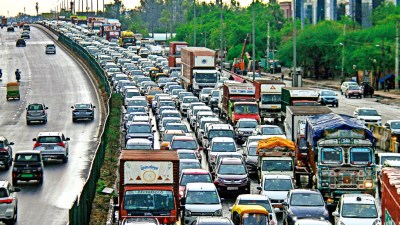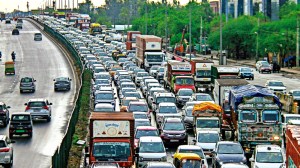Delhi’s property geo-tagging deadline extended: All you need to know about the MCD exercise
What is geo-tagging? How does it work? Why does the MCD want to geo-tag properties in Delhi?
 The headquarters of the MCD. (Wikimedia Commons)
The headquarters of the MCD. (Wikimedia Commons)The national capital’s property geo-tagging deadline has been extended, according to a statement released by the Municipal Corporation of Delhi (MCD). For the financial year 2024–2025, residents will have until February 29 to finish the geo-tagging procedure and receive a 10% refund on their lump sum advance tax payments.
Prior to this, the MCD had set a deadline of January 31. However, in light of the technical difficulties that several property owners, especially those using the MCD mobile app on iPhones, have brought to light, the municipality has decided to give more time.
What is geo-tagging?
Geo-tagging is the process of alloting geographic coordinates to media based on the location of a mobile device. Geotags can be applied to photos, videos, websites, text messages, and QR codes, and could also include time stamps or other contextual information.
Nowadays, smartphones and digital cameras come equipped with GPS (Global Positioning System) or use other location-based technologies to automatically geotag photos. By default, every photo you take with your iPhone or Android tags your GPS location and stores that data with your photo. In the context of photographs, for example, geo-tagging allows users to associate a specific location with the image.
Geo-tagging properties means digitally mapping a property with the geographic information system (GIS). This means that a property can be identified on a map with its unique and permanent latitude and longitude coordinates. MCD officials say that the capital’s property geo-tagging exercise will have several benefits, not only for the corporation but also for residents.
Why is geo-tagging important?
According to an MCD official, geo-tagging properties will prove instrumental in boosting tax collection potential. By distinguishing between tax-paying and non-tax-paying entities, it will reduce tax evasion and help enhance revenue collection.
Another advantage of geo-tagging is the ability to pinpoint illegal and unauthorised properties and colonies. This will help in urban planning, as it will allow the civic body to take corrective actions as required.
According to the MCD, geo-tagging will also streamline essential services such as sanitation and road repairs in colonies, and help recognise area-based residential needs. This will make it easier for civic bodies to ensure more efficient service delivery.
In times of emergencies, such as natural disasters or accidents, geo-tagged information can become crucial for quick and targeted interventions in future as responders can utilise the data to navigate and address issues. It can help in maintaining healthy urban spaces by monitoring environmental factors like green spaces, pollution sources, and ecological reserves.
What are some concerns with the exercise?
However, not everyone is happy with this exercise.
“Many have complained that they are unable to self geo-tag the properties… there are many senior citizens who are unable to complete the task on their own,” Sharaf Sabri, general secretary of Jangpura RWA, told The Indian Express. “People already face technical issues while paying the yearly property taxes as the portals and apps keep crashing and showing errors, the additional responsibility of self geo-tagging the properties should not fall on the residents,” he said.
Meanwhile, Savita Soni from the Vasant Kunj RWA says that there is simply no awareness about the process. “Despite being a member of the RWA, I am hearing about geo-tagging for the first time… no circulars, notices and awareness has been spread by the MCD regarding the geo-tagging procedure,” she said.
This lack of awareness extends to the supposed benefits of the exercise. “Many people are doubtful that geo-tagging would get them into the government’s notice and are unaware of its benefits, if any,” Sharad Vashisht, General Secretary of the Mehrauli RWA, said.
How to self geo-tag properties in Delhi ?
Here is a step-by-step breakdown.
- Download UMA Mobile App: Install the latest version (1.8) of the UMA Mobile App.
- Visit Property Location: Ensure necessary permissions like device location are allowed on your mobile phone.
- Login and OTP: Log in using your registered mobile number, and enter the OTP.
- Select Property Tax Module: Choose the property tax module.
- Select UPIC: Pick the Unique Property Identification Code (UPIC) of the property to be geo-tagged.
- Capture Geo Coordinates: Press the capture geo-coordinate button to capture the property’s geographic coordinates.
- Upload Pictures: Capture and upload pictures of the property along with relevant details.
- Add Caption: Include a caption with details like the name of the building, floor, etc.
- Save and Submit: Save the property details and submit them.
- Verification: The geo-tagged UPIC details will be shown in green color if the process is successful.
Which other cities have made attempts to geotag properties?
Prior to the MCD, several other cities have made attempts to geo-tag.
The Municipal Corporation of Greater Mumbai (MCGM) has been working on geo-tagging properties to improve urban planning and service delivery. Commissioner Iqbal Singh Chahal and also told the Bombay High Court during a hearing on January 12 last year that it is exploring the option of geo-tagging manholes, their chambers and covers so that ward officers can take prompt action in case a manhole cover is stolen.
The Bruhat Bengaluru Mahanagara Palike (BBMP) has also undertaken geo-tagging initiatives for property tax assessment and urban planning. Initiatives to geo-tag trees, potholes were also announced by the BBMP.
Municipal Corporations of Chennai, Hyderabad, Ahmedabad and Pune have previously shown interest in geo-tagging of different public entities.
- 01
- 02
- 03
- 04
- 05






































